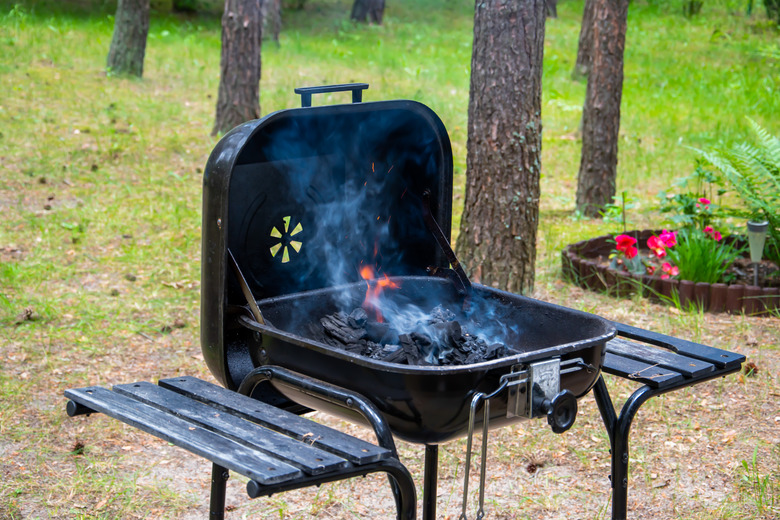Disposing Of Used Charcoal Briquettes
After enjoying a delicious meal cooked on the grill, you may find yourself with a pile of used charcoal briquettes you no longer need. Disposing of them is quite easy, but you need to know what kind of charcoal you have before you do so. For instance, you dispose of wood charcoal quite differently than you do briquettes treated with lighter fluid and other chemicals.
Lump Wood Charcoal
Lump Wood Charcoal
Sometimes called charwood, lump wood charcoal is a completely natural product. Charwood is made by burning logs or fallen trees in a kiln. The process is completely pure and involves no chemicals or additives. Because lump charcoal is completely organic, disposing of it requires no special treatment. You can simply give the charcoal a full 48 hours to cool and then drop it into a nonflammable container, like an old coffee can. You can then drop the can into your regular garbage.
You also have the option of recycling lump charcoal in your garden. You can add the leftover charcoal to your compost pile or fertilize your plants directly with the ash. The ash contains potassium carbonate, which benefits many plants while raising the pH level in your soil. Avoid fertilizing acid-loving plants, like blueberries, azaleas, and hydrangeas.
A quick word of caution: Never buy or burn lump charcoal if it comes in perfectly formed rectangles. A perfect shape means the charcoal was made from leftover construction lumber rather than untouched wood. There is no way to know if this wood was chemically treated at any time, so it's best to avoid it altogether.
Hardwood Charcoal Briquettes
Hardwood Charcoal Briquettes
Like lump charcoal, natural hardwood briquettes start out as trees and logs. They're then shaped into the familiar briquette form by the charcoal producer. Like lump charcoal, hardwood briquettes are theoretically all natural. The problem is that Mother Nature doesn't make perfectly square charcoal bricks. Even if the briquette is labeled as "natural," something very unnatural has happened.
In many cases, the ingredient added to form the briquettes and hold them together is a mixture of sawdust, wood scrap, and coal dust. Some companies use petroleum binders, however, which may not be quite as clean as you like. If you're certain that your briquettes consist only of pure hardwood and other natural ingredients, you can dispose of them the same way you would lump charcoal. If you have any doubts, dispose of it as you would chemically treated charcoal.
Chemically Treated Briquettes
Chemically Treated Briquettes
To make life easier, many charcoal briquettes contain lighter fluid and other additives to make igniting them easier. Due to the chemicals, you can't recycle these briquettes in your garden or throw them away with your regular trash. Instead, soak the briquettes in water for 20 minutes to an hour, saturating them thoroughly.
Next, place the briquettes in a nonflammable container. Again, an empty coffee can does the trick nicely. When you're ready, take the briquettes to your nearest hazardous waste drop-off facility. The experts there will make sure the charcoal gets disposed of properly.
Japanese-Style Binchotan Charcoal
Japanese-Style Binchotan Charcoal
In Japan, lump charcoal, called binchotan, is made by heating only the branches and stems of the ubamegashi oak tree. As a result, binchotan charcoal looks like round cylinders rather than lumpy masses of charwood. Binchotan is expensive and very difficult to light. It can take 30 minutes just to get the fire started.
Once you get it lit, however, binchotan can easily burn for five hours. This is definitely charcoal for the hardcore griller who needs time to roast a pig or feed a crowd. Like lump charcoal, binchotan is all natural. To dispose of it, verify that it is cold all the way through and then throw it in a fireproof trash can.
References
- Steven Raichlen's Barbecue Bible: A Crash Course on Charcoal: Types of Charcoal for Grilling
- Montgomery County, Maryland: Department of Environmental Protection: How to Recycle/Dispose of Charcoal
- Char-Broil: How to Dispose and Recycle Charcoal
- Napa Recycling & Waste Services: Ask the Experts: How Can I Dispose of Charcoal?
